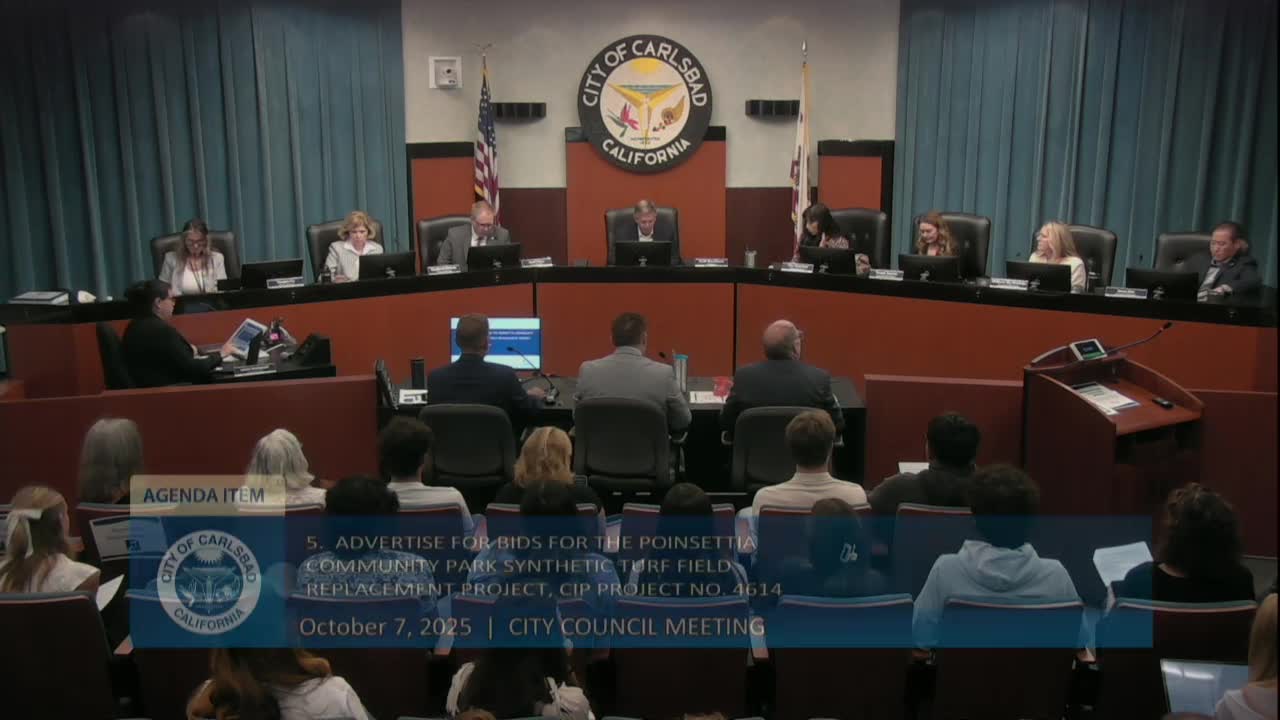Carlsbad council approves bid package for Poinsettia Park synthetic turf replacement after heated public debate
Get AI-powered insights, summaries, and transcripts
Subscribe
Summary
The City Council voted 4–1 to authorize advertisement for bids to replace the Poinsettia Community Park full-size field with a new non‑infilled synthetic turf system; supporters argued for playability and access while opponents raised health, microplastic and environmental concerns.
The Carlsbad City Council on Oct. 13 voted 4–1 to adopt project documents and authorize the city clerk to advertise for bids to replace the synthetic turf at Poinsettia Community Park with a Tencate “Pivot” system, a non‑infill synthetic turf the city staff described as PFAS‑free and fully recyclable in manufacturer projections.
The vote follows a two‑hour public hearing and staff presentation in which Parks and Recreation Director Kyle Lancaster, Park Planning Manager Nick Stupin, and Park Services Manager Todd Rees walked council through the project scope, costs, material specifications and maintenance comparisons to natural grass.
Staff said Poinsettia’s current turf — originally installed in 2004 and replaced once — is near the end of its useful life. The recommended Tencate Pivot system uses no crumb rubber or other performance infill; instead the product relies on a mineral ballast and an under‑turf shock/attenuation pad. Staff told the council the system carries a 12‑year warranty on the turf surface and a 25‑year warranty on the shock pad, and that the manufacturer reports laboratory testing showing no detectable PFAS in surface runoff. The project engineer’s construction estimate is about $2,000,000; staff presented a 24‑year life‑cycle comparison showing near parity between maintaining natural grass versus the proposed synthetic turf when amortized over two surface replacement cycles (staff presented totals of about $4,244,000 for the synthetic system and $4,245,000 for grass over 24 years).
User groups and parents gave the council sharply divided testimony. Coaches and club representatives including Michael Duggan, Jim Barnhill and Robin Cole told council that natural grass fields in Carlsbad have limited hours, frequent closures and inconsistent surfaces that cause injuries and force cancellations; they said synthetic turf substantially increases annual usable hours and supports youth sports, tournaments and local economic activity. Multiple parents and youth‑sports advocates said modern turf technologies are improved, reduce water use and provide predictable playing surfaces that keep kids active.
Opponents including Vanessa Forsyth, Diane Wolke of Safe Healthy Playing Fields and several residents urged the council to reject or postpone the project, citing concerns about microplastic shedding, long‑term disposal and recycling claims, potential undisclosed chemical contaminants, heat and impacts on children’s health and local ecosystems. Speakers pointed to gaps in long‑term independent studies and asked the council to apply the precautionary principle. Several commenters also asked for more independent testing and verification of the vendor’s claims about PFAS and recyclability.
Council questions focused on the absence of crumb rubber, water consumption differences between grass and reclaimed‑water irrigated turf, field availability, expected closure time for construction (staff estimated roughly two months), the pad replacement schedule and the city’s Integrated Pest Management (IPM) practices and fertilizer/pesticide protocols should the council choose grass. Staff said the Poinsettia project would require about 2,993,000 gallons of reclaimed water annually to maintain natural turf and that most city fields already use reclaimed water; the northwest quadrant of the city currently lacks reclaimed infrastructure and uses potable supplies for some parks.
On environmental and health testing, staff said the vendor supplied laboratory data showing no detectable PFAS under the vendor’s test methods and that the field drainage testing detected no PFAS. Council members asked whether that testing was independent; staff said testing had not been independently commissioned by the city. Staff also described a recycling pathway the vendor has used elsewhere and a plan the vendor describes for eventual West Coast recycling capacity; staff noted the Pivot product is new to the market and that no end‑of‑life recycling has yet been performed for this specific product.
Councilmember discussion reflected the split in testimony. Councilmember Shin said the absence of crumb rubber was decisive for him and emphasized field consistency and water savings; Councilmember Acosta said she favored natural grass on principle and cited community values on open space and sustainability; Councilmember Burkholder and Mayor Blackburn supported the staff recommendation citing availability, durability and current vendor testing; Councilmember Bob (Bock) Patel said she remained undecided during the hearing but later voted with the majority. The motion to adopt the project documents and advertise for bids passed 4–1.
Staff will post bid documents on the city bidding website, return to council with a contract award recommendation after bid review, and coordinate a construction schedule that staff said would likely close the field about two months for replacement. Staff also told council they would monitor the product’s performance for possible application to other city sites.
Discussion-only items, outstanding requests and next steps: staff told council they would provide additional cost detail (including inflation assumptions), consider independent testing of product runoff and materials if council desires, and continue coordination with user groups about field closures and tournament scheduling. The council did not adopt any new independent testing program during the meeting.
The council’s action authorizes procurement steps; a separate future agenda item will be required to award a construction contract after bid opening and review.
